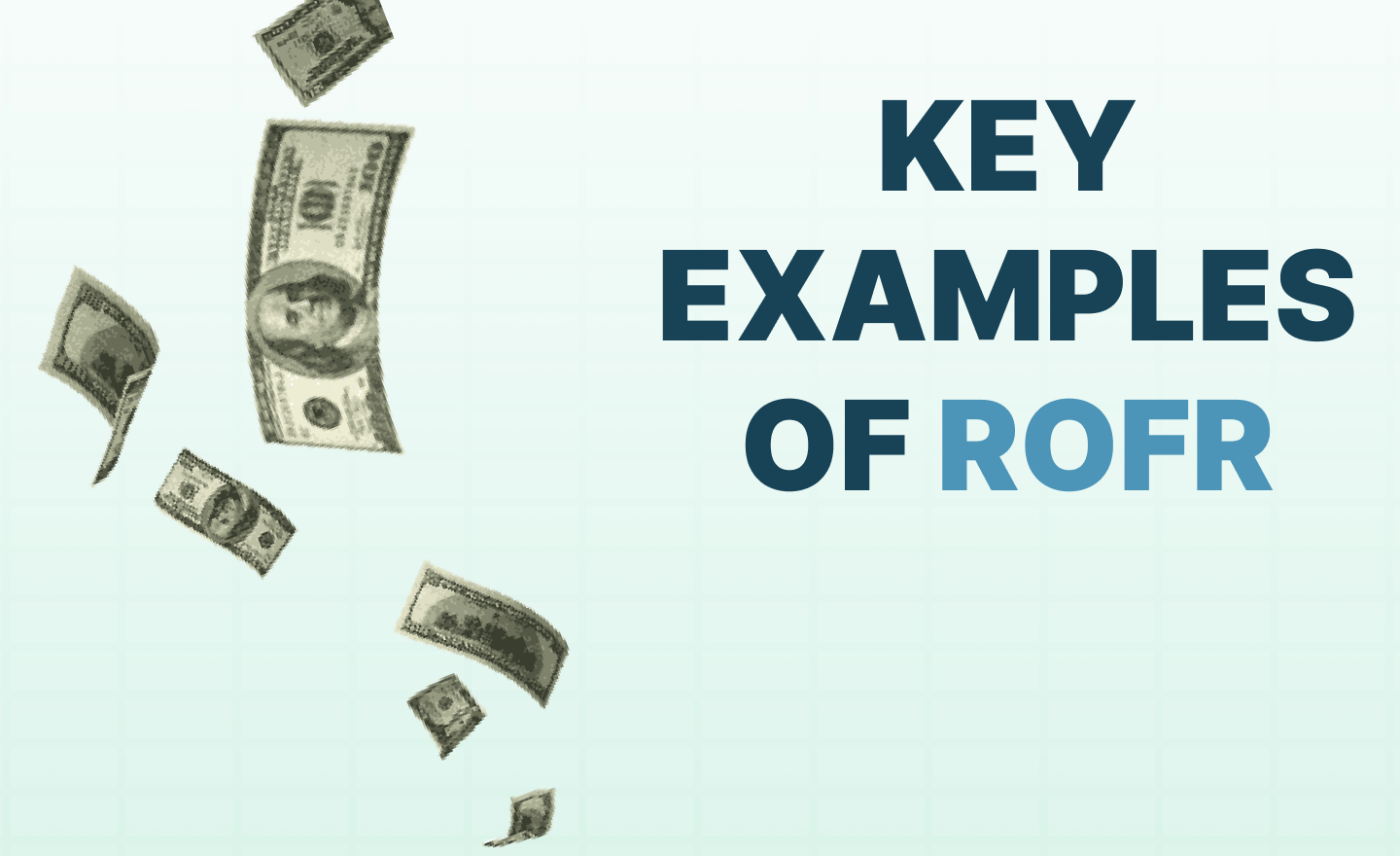May 2, 2025
What is a Right of First Refusal (ROFR)?
Published on
May 2, 2025

Table of Content
A Right of First Refusal (ROFR) is an agreement that grants the holder the first opportunity to buy an asset before it is sold to someone else, providing the holder with a right to match any offers made by potential buyers.
With a ROFR in place, the rights holder has priority and control over the asset's sale. If the owner receives an offer from another party, they are obligated to inform the ROFR rights holder. In turn, the holder can match that offer and complete the purchase themselves. This right allows them to step in and acquire the asset ahead of any buyers.
The key defining aspects of a ROFR are:
- Legal right to purchase an asset before third parties
- Allows the holder to match any offer the owner receives
- Gives holder priority and control over future sale
- Contractual agreement between asset owner and ROFR holder
By obtaining a right of first refusal agreement, individuals gain control over market value and influence over how an asset is sold. They can purchase it before external buyers get opportunities to make offers.
How Does a ROFR Work?
- The asset owner receives an offer from a third-party buyer. A buyer (an individual or a company) interested in buying an asset, which could include shares of a company or entity, property, or any other asset, will submit an offer to the owner with proposed terms, including price, closing date, etc.
- The owner must notify the ROFR holder about this third-party offer. The specific notification process will be outlined in the ROFR agreement. Usually, in such cases, the manager of the entity or an agent acting on behalf of them, such as a lawyer, will contact the ROFR holder in writing within a certain number of days of receiving the offer. They will provide the ROFR holder with the proposed terms and conditions.
- The ROFR holder has a defined timeframe to decide whether to match the offer. During the election period, around 30 days after the holder receives notice, the holder of the ROFR reviews the offer made by a party and decides whether they want to match it and purchase the asset on the same terms.
- If the ROFR holder declines to match the offer, the owner can sell it to a third party. The right of first refusal agreement is no longer active once the holder declines or when the specified period for making a decision expires. The asset owners can proceed with finalizing the sale with the party who initially made the offer.
- If the ROFR holder chooses to match the offer terms, they can purchase the asset themselves. Matching entails agreeing on aspects such as price, closing date, contingencies, and other conditions set forth by that prospective buyer. Once matched, both parties involved—the ROFR holder and owner—can proceed with closing on the transaction.
To summarize the concept of the right of first refusal grants, the holder can purchase the asset before it can be sold to someone. The owner must allow the holder to match any third-party offer first. If declined, the owner is free to sell to whoever they choose.

Differentiating ROFR, ROFO, and Option
There are distinctions between a right of first refusal (ROFR), a right of first offer (ROFE), and an option:
Right of First Refusal (ROFR)
- When a third-party buyer presents an offer to the asset owner
- The holder of ROFR has the privilege to match that offer and acquire the asset under terms
- The asset owner must notify the ROFR holder of the 3rd party offer
- The ROFR holder can decide to match the offer or decline, allowing the sale to the 3rd party
Right of First Offer (ROFO)
- The ROFE holder has the first chance to make an offer to purchase the asset
- The asset owner does not have to accept the ROFE holder's offer - they can reject it
- The owner has no obligation to give the ROFE holder a chance to match any 3rd party offers later
Option
- The option holder has the right to purchase the asset at a specified price (the strike price)
- The option holder can exercise the option to force a sale of the asset at the set price
- The asset owner must sell the asset to the option holder if they exercise the option
The critical distinction is that with a ROFR, the holder can match any 3rd party offer. However, with a ROFO or option, they do not have this right.

Key Examples of ROFR
Rights of refusal find application in industries and transactions. Here are some common examples;
Real Estate
ROFR clauses are prevalent in real estate deals. For example:
- A tenant wants the first option to buy a property if the landlord decides to sell.
- A developer negotiates a ROFR on adjacent land for future expansion.
- An individual wants a ROFR on a home that's currently too expensive for them.
Business Partnerships, Startup Ventures
Partners may use ROFR when ownership changes:
- If a partner wants to exit the business, the remaining partners have a ROFR on their ownership stake.
- When bringing on new investors, existing investors have a ROFR on the new investors' shares if they later want to sell.
Stocks
Shareholder rights plans often include ROFR provisions:
- If a significant shareholder wants to sell their stake, the company might have a ROFR on those shares.
- Preferred shareholders may obtain a ROFR that gives them priority over common shareholders.
Other Examples
- ROFR on sports teams - if the owner wants to sell the team, the league has the first right to purchase it.
- Recording contracts - record labels often negotiate an artist's ROFR on future albums.
- Franchises - franchisors sometimes retain a ROFR if a franchisee wants to sell their location.
The flexibility of ROFR makes it a useful option across diverse industries and transactions where priority, control, or exclusivity is desired by one of the parties.
Pros and Cons of ROFR
A ROFR offers essential benefits, but there are also some potential drawbacks. Here are the key pros and cons:
Pros
- Control over future sales: The main advantage of ROFR is control. As the holder, you can block the sale of the asset to anyone else. This power lets you dictate the terms of sale.
- Ability to match any offer: With ROFR, the asset owner must notify you of any 3rd party offers they receive. You then have the right to match those offers and purchase the asset yourself. This ensures you will get all the benefits of an attractive offer.
Cons
- No guarantee of purchase: While ROFR gives you the option to buy, you are not obligated to complete the purchase. You can decline to match an offer if you change your mind about buying the asset.
- Limits owner's options: For the asset owner, ROFR restricts who they can sell to and the offer price. They must first give you the option before considering other buyers. This reduces the market of potential buyers.
The ability to control the sale and terms of an asset you're interested in provides a significant advantage. However, ROFR does not guarantee you will end up purchasing the asset. It's essential to weigh these pros and cons based on your specific goals.
How to Get a Right of First Refusal
Getting a right of first refusal requires several steps:
- Express Interest to the Owner - The first step is letting the current asset owner know you want to purchase the asset. Indicate that you would like to negotiate a ROFR agreement.
- Negotiate the Terms - Work with the owner to outline the specific terms of the ROFR. Key details to agree on are the purchase price, whether it's a fixed amount or matches third-party offers, the notification process if an offer comes in, and the timeframe you have to decide on matching an offer.
- Have an Attorney Draft the Agreement - Once terms are negotiated, have a real estate attorney draw up the official ROFR agreement. This ensures the interests of both parties are protected legally. Review the agreement carefully before signing. Sometimes ROFR is embedded in fundraising documents, like subscription agreements or other corporate documents.
- Provide Consideration to the Owner - In most cases, you will need to compensate the owner in some way for granting the ROFR. This is usually a nominal fee paid upfront. It makes the agreement legally binding. Be sure the consideration amount is included in the contract.
Following these steps allows you to secure an asset owner's first refusal right. With the ROFR in place, you'll gain more control over the potential purchase of the asset. Just be sure to negotiate favorable terms and have an attorney review the lease agreement before signing.
ROFR Clause Guidelines
The ROFR clause should clearly outline key terms, including:
- Price - Include a fair market valuation process to determine the price if a third-party offer comes in. This stops the owner from inflating the offer price to prevent the ROFR holder from buying it.
- Offer terms - Specify details like earnest money amount, closing date, financing terms, etc. The ROFR holder has the right to match the exact offer terms.
- Notification process - Clearly outline how the owner will notify the ROFR holder if they receive an offer. Require written notice, including offer details.
- Timeframe to match offer - The ROFR holder should get 30-60 days to decide whether to match the third-party offer and buy the asset. This gives them reasonable time to secure financing.
- Asset being sold - Provide a clear description of the asset in question. Remove any ambiguity about the exact asset covered by the ROFR.
Getting the ROFR clause right is crucial to protect both parties' interests. Consult an attorney to ensure proper setup of notification procedures, timeframes, valuation method, and description of the asset. With the right ROFR clause in place, you can exercise your right when the time comes.
Using ROFR in Real Estate
In real estate transactions, refusal rights are frequently used to give buyers more control in competitive or uncertain situations. Here are a few instances where a right of first refusal clause (ROFR) can prove beneficial in the real estate industry:
Buying Investment or Commercial Property
When considering the purchase of an investment property (for instance, an apartment building or commercial real estate), buyers often engage in negotiations involving ROFR. This allows them to control sales even if they cannot acquire the property.
Multiple Interested Buyers
If there are several other potential buyers or interested parties in a property, the seller may grant one an ROFR to incentivize them to make an initial offer. This privileges their offer above future prospective buyers. The ROFR holder can match any deal the owner is offered.
Maintaining Control Over a Desired Asset
Sometimes, a buyer is interested in a property but cannot purchase it immediately. Negotiating a ROFR allows them to maintain some control over the sale. If the owner decides to sell in the future, the ROFR holder has the first chance to match. This helps them buy a property they want even if the timing isn't right initially.
ROFRs are useful in real estate when buyers want to control future sales of a property they have a high interest in purchasing. The ROFR provides flexibility to match terms and make the purchase when ready.
Alternatives to ROFR
A ROFR gives a party the first chance to purchase an asset before the owner can sell it to another potential buyer. But it's not the only way to control the sale of an asset. Here are some alternatives to consider:
Right of First Offer (ROFO)
An alternative to ROFR is a right of offer (ROFO). With ROFO, the owner is obligated to present their offer to the holder before selling the asset. However, unlike ROFR, the holder does not possess the right to match offers made by other buyers or interested parties. If the holder declines the owner's offer, the owner is free to sell it to anyone.
ROFO provides less control than ROFR but may be easier for owners to accept since they make the first move.
Purchase Option
A purchase option gives the holder the right (but not the full contractual obligation) to buy the asset at a predetermined price within a defined period.
This guarantees that the holder can purchase at that price if they choose to exercise the option. However, it does not allow them to match the selling price of other offers that may come in higher or lower.
Letter of Intent
A letter of intent (LOI) is a non-binding agreement that outlines significant terms negotiated between parties interested in a transaction. It provides a framework for an eventual binding contract.
Parties could include a right of first refusal or option to purchase in an LOI. This signals mutual interest in a deal while details get finalized. But it does not guarantee a transaction will occur.
ROFR provides more solid protection. However, an LOI can be a preliminary step.
Key Takeaways
- ROFR is a legal right to purchase an asset before third parties by matching any offer the owner receives. The owner must notify the ROFR holder of any third-party offers.
- The holder can decide whether to match the third-party offer and complete the purchase. If the holder declines, the owner can sell to a third party.
- ROFR provides a degree of control over the future sale of an asset. As the holder, you get to "cut in line" before potential buyers.
- However, ROFR does not guarantee the holder will purchase the asset. If they decline to match an offer, the owner can sell to whomever they choose.
- The holder only has the right to match bona fide third-party offers - they cannot compel the owner to sell at an arbitrary, lower price.
- ROFR agreements are legally binding contracts between the asset owner and the holder. Key terms like notification process, matching period, and more must be clearly defined.



